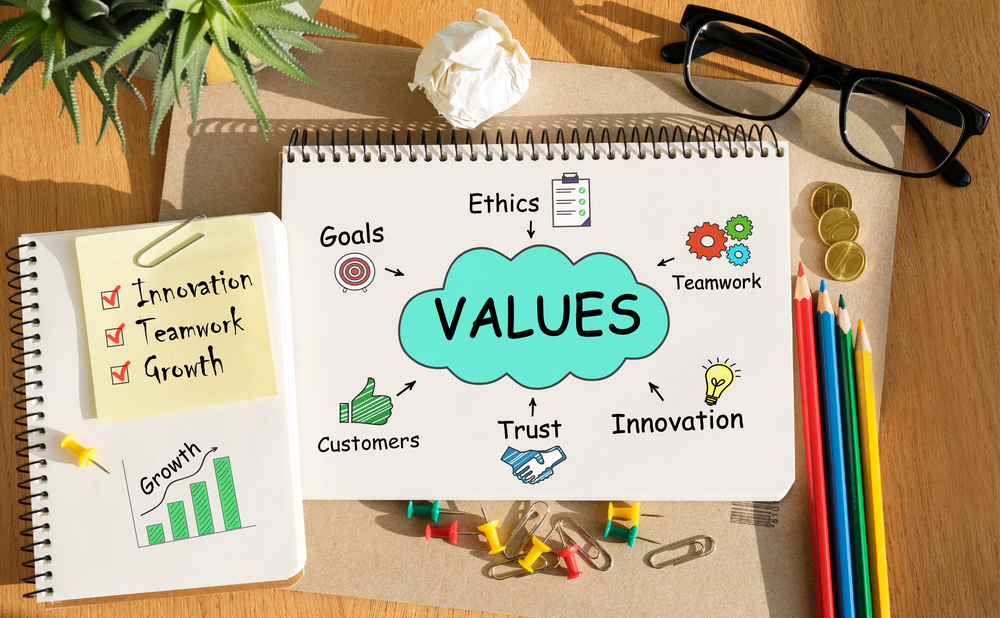I decided to write this post today to celebrate World Values Day. This year’s theme is reconnecting, something I suspect many of us crave after the crazy couple of years we have all experienced.
For those new to the values conversation, I want to share what they are and how they can impact our lives at many distinct levels.
As a start, I want to clarify the confusion around values and beliefs.
What is the Difference Between Values and Beliefs?

When it comes to development, many people are confused about values versus beliefs because they are different.
Values are principles we live by which inform and guide our behaviour and what we do or do not do. They are often solid and grounded and rarely change that much unless we experience significant life changes. Examples might be marriage, the death of a loved one or the birth of our first child.
Whereas beliefs are opinions based on the thoughts we are given or ones we keep thinking.
The good news is we can change our beliefs; a good idea when they become old and outdated and limit our growth.
A limiting belief might be, “I am not good at presenting ” or “I struggle to manage a team”.
A classic example of how beliefs can change: As children, we believe in the tooth fairy or Father Christmas until new information comes along.
If we are willing, we can map this over to our adult life too. What beliefs are you currently holding that no longer serve you? A topic for another post.
Personal Versus Company Values
Let us start by looking at personal values. Examples might be love, truth, integrity, ethics, courage, gratitude, appreciation, honesty, hard work.
The list goes on.
If you want some ideas around values, look at this list from James Clear, the author of Atomic Habits, who shares a number you can choose. As James highlights, selecting a handful as your focus is better than lists and lists; otherwise, nothing is a priority in how you live your life.
The same premise works across organisations too.
An organisation or company’s values do not have to be unique; they should be what your company wants to see in its employees. They are clearly stated principles about your vision, mission and how your employees live your culture as they interact together, and with your customers.
As an example, here are Microsoft’s values: innovation, trustworthy computing, diversity and inclusion, corporate social responsibility, philanthropies, and environment.
These are based on how Microsoft wants to be seen as an employer and the provider of services to people and organisations across the globe.
Working and Living With Values

Values influence your behaviour because you use them to decide between alternative actions. Values are the cornerstones of who we are and how we do things. They form the basis of how we see ourselves as individuals, how we see others, and how we interpret the world in general.
The more we align and live our values, the more we stay with our true selves. One of the first steps to living our values is writing them down and consistently displaying them.
This is one of the reasons organisations have their values on walls, plaques, and screen savers.
Writing down your values (and keeping them somewhere you can see them) helps build the mind-body connection to your core values. This is the first step in embodying what your values mean to you.
By physically putting pen to paper, you are also separating your values from the rest of the thoughts in your head. You are creating significance and elevating your values to something important.
Plus, writing down your values will help you remember them when you need to decide or stand up for your values.
If you are using a journal or notebook, write down each of your values on its own page. This way, you will have room to add your thoughts and insights as you go through the rest of these steps.
The easy next step is to look at definitions of your values and then evaluate what that might mean for you in how you demonstrate your specific value.
For instance, let’s say courage is one of your values. Our trusty friend Google defines courage as ‘mental or moral strength to venture, persevere, and withstand danger, fear, or difficulty.’
How might this work for you?
Let’s use an example we shared above related to business around a lack of presentation skills which we shared as a limiting belief.
If we live our value of courage, we might decide to volunteer to present at the next meeting and practise our presentation as we develop our strength in the interim.
The same simple yet effective idea can be used in living your personal and your organisation’s values.
Until next time,
Julia Carter
How Can We Help Your Personal Performance?
At Zestfor, we offer a range of custom-built personalised coaching and development programmes to suit the needs of a leader, individual or team that can be delivered face-to-face or virtually to work flexibly with geographically dispersed team members and their workloads.
Click here for a full programme description or call one of our team on 0845 548 0833.
About Zestfor
Zestfor specialises in developing leadership Training programmes and resources scientifically tailored for technical markets – including Pharmaceutical, I.T., and Life Sciences.
Our blend of in-classroom, online, and virtual live-stream delivery methods will engage and assure even the most introverted team members from the first meeting – whether face-to-face or virtually. So, to have a brief chat, call us on 0845 548 08









